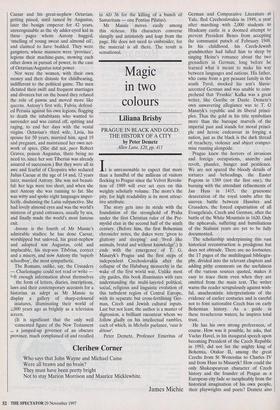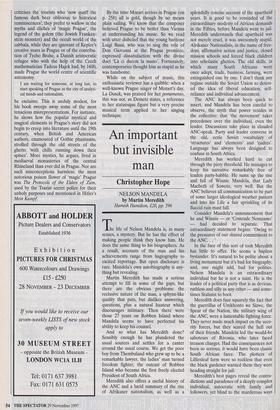Magic in two colours
Liliana Brisby
PRAGUE IN BLACK AND GOLD: THE HISTORY OF A CITY by Peter Demetz Allen Lane, £20, pp. 411 It is unreasonable to expect that more than a handful of the millions of visitors flocking to Prague since the Velvet Revolu- tion of 1989 will ever set eyes on this weighty scholarly volume. The more's the pity, for high readability is its most attrac- tive attribute.
The story gets into its stride with the foundation of the stronghold of Praha under the first Christian ruler of the Pre- myslid clan in the second half of the ninth century. (Before him, the first Bohemian chronicler notes, the dukes were 'given to gluttony and sleeping' and 'lived like animals, brutal and without knowledge'.) It ends with the emergence of T. G. Masaryk's Prague and the first steps of independent Czechoslovakia after the collapse of the Habsburg monarchy in the wake of the first world war. Unlike most city guides, this book illuminates with rare understanding the multi-layered political, social, religious and linguistic evolution of this turbulent region of Central Europe, with its separate but cross-fertilising Ger- man, Czech and Jewish cultural inputs. Last but not least, the author is a master of digression, a brilliant raconteur whom we follow gladly on his intellectual rambles, each of which, in Michelin parlance, `vaut le detour'.
Peter Demetz, Professor Emeritus of
German and Comparative Literature at Yale, fled Czechoslovakia in 1949, a year after marching with 2,000 students to Hradcany castle in a doomed attempt to prevent President Benes from accepting the communist putsch of February 1948. In his childhood, his Czech-Jewish grandmother had lulled him to sleep by singing Heine's romance about the two grenadiers in German, long before he learned what it meant to make his way between languages and nations. His father, who came from a goy peasant family in the south Tyrol, mocked his son's Slavic- accented German and was unable to com- prehend that `Frankie' Kafka was a great writer, like Goethe or Dante. Demetz's own unwavering allegiance was to T. G Masaryk's republic and its liberal princi- ples. Thus the gold in his title symbolises more than the baroque marvels of the imperial past and stands for moral princi- ple and heroic endeavour in forging a nation, just as the black is the dark thread of treachery, violence and abject compro- mise running alongside.
Prague knew the horrors of invasions and foreign occupations, anarchy and revolt, plunder, hunger and pestilence. We are not spared the bloody details of tortures and beheadings, the Easter Pogrom in 1389 (not the first one), the burning with the attendant refinements of Jan Huss in 1415, the gruesome desecration of the royal tombs after the uneven battle between Hussites and Crusaders, the forced expatriation of all Evangelicals, Czech and German, after the battle of the White Mountain in 1620. Only the upheavals, suffering and humiliations of the Stalinist years are yet to be fully documented.
The scholarship underpinning this vast historical reconstruction is prodigious but does not obtrude. There are no footnotes; the 17 pages of the multilingual bibliogra- phy, divided into the relevant chapters and adding pithy comments on the usefulness of the various sources quoted, makes it easy to trace them even when they are omitted from the main text. The writer warns the reader scrupulously against wish- ful, anachronistic interpretations of the evidence of earlier centuries and is careful not to foist nationalist Czech bias on early Bohemian history. As a guide in these treacherous waters, he inspires total trust.
He has his own strong preferences, of course. How was it possible, he asks, that Vaclav Havel, in his inaugural speech upon becoming President of the Czech Republic in 1993, did not list the mighty king of Bohemia, Otakar II, among the great Czechs from St Wenceslas to Charles IV and from Huss to Masaryk? How could the only Shakespearean character of Czech history and the founder of Prague as a European city fade so inexplicably from the historical imagination of his own people, their playwrights and poets? Demetz also criticises the tourists who 'now quaff the famous dark beer oblivious to historical reminiscences'; they prefer to wallow in the myths and clichés of 'magic Prague', the legend of the golem (the Jewish Franken- stein monster) and the occult world of the cabbala, while they are ignorant of Kepler's creative years in Prague or of the contribu- tion of Tycho Brahe, a Danish aristocratic refugee who with the help of the Czech mathematician Tadeus Hajek had, by 1600, made Prague the world centre of scientific astronomy.
I am waiting for someone, at long last, to start speaking of Prague as the city of analyti- cal minds and rationalists,
he exclaims. This is unduly modest, for his book sweeps away some of the most tenacious misrepresentations. For instance, he shows how the popular mystical and magical elements in Prague's story did not begin to creep into literature until the 19th century, when British and American authors, enamoured of Gothic phantasms, strolled through the old streets of the ghetto 'with chills running down their spines'. More mystics, he argues, lived in mediaeval monasteries of the central Rhineland than ever did in Prague. Nor are such misconceptions harmless: the most notorious poison flower of 'magic' Prague was The Protocols of the Elders of Zion, used by the Tsarist secret police for their unholy purposes and mentioned in Hitler's Mein Kampf. By the time Mozart arrives in Prague (on p. 258) all is gold, though by no means plain sailing. We know that the composer believed Prague to be better than Vienna at understanding his music. So we read with utter disbelief that the young baritone Luigi Bassi, who was to sing the role of Don Giovanni at the. Prague premiere, expressed dissatisfaction with the divine duet 'La ci darem la mano'. Fortunately, contemporaries thought him as stupid as he was handsome.
While on the subject of music, this enthusiastic reviewer has a quibble: when a well-known Prague singer of Mozart's day, La Dusek, was praised for her portamento, this was not, as Demetz states, a reference to her statuesque figure but a very precise musical term applied to her singing technique.



















































































 Previous page
Previous page